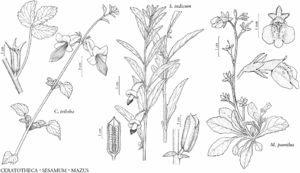Difference between revisions of "Mazus pumilus"
Nova Guinea, n. s. 9: 31. 1958.
FNA>Volume Importer |
FNA>Volume Importer |
(No difference)
| |
Revision as of 18:28, 24 September 2019
Annuals, 2–20 cm; stolons absent. Stems erect, ascending, or prostrate, sometimes branched near base, hairy. Leaves: basal leaves: petiole 2–13 mm; blade ovate to oblanceolate, 5–30 × 2–15 mm, faces glabrous; cauline leaves: petiole 0–8 mm, ciliate or glabrous; blade obovate to spatulate, 8–30 × 3–20 mm, base long-cuneate, usually ciliate near base, faces glabrous or abaxially hairy along veins, adaxially hairy proximally. Racemes scapose or terminating erect stems, 0.5–12 cm. Pedicels 2–10 mm, hairy or glabrous; bracteoles narrowly triangular, 1–1.5 mm, glabrous. Flowers: calyx 5–7 mm, sparsely hairy, tube 2–3 mm, lobes 3–4 mm; corolla 7–9 mm, tube 4–5 mm, abaxial lobes 3–4 mm, adaxial 2–3 mm. Capsules 2–3 × 1.8–2.2 mm. Seeds 0.4–0.6 × 0.3–0.4 mm. 2n = 40 (Asia).
Phenology: Flowering spring–fall.
Habitat: Lawns, roadsides, stream banks, lakeshores, shady, moist areas.
Elevation: 0–700 m.
Distribution
Ala., Ark., Del., D.C., Fla., Ga., Ill., La., Mass., Miss., Mo., N.Y., N.C., Ohio, Okla., Oreg., Pa., S.C., Tenn., Tex., Va., Wash., W.Va., Wis., e Asia, introduced also in Central America, South America, Europe, Africa, Australia.
Discussion
The description and illustration of the type by Burman do not seem to match this species. Steenis examined specimens used by Burman and determined that they are indeed referable to Mazus pumilus; his combination has priority over M. japonicus.
Selected References
None.
